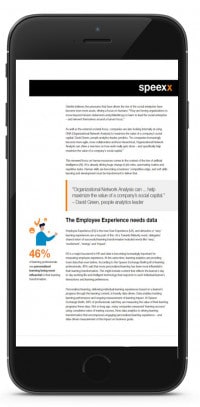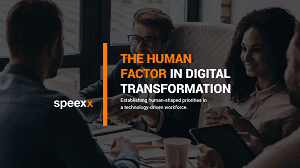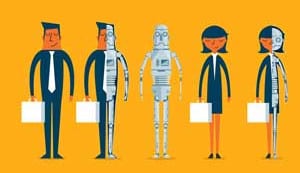Whitepaper
Managing Human Capital
The Big Data Era of HR
Talent and technology are top of mind in 2020 and managing human capital in the big data era of HR looks set to take priority for business success. Discover the importance of human skills in the big data era and how your organization can maximize the benefits of data and learning analytics.
Whitepaper | The Big Data Era of HR
Find out more about the Big Data Era of HR
In this whitepaper about the big data era of HR

What is big data in human resources?
When it comes to human resources, big data refers to the use of multiple data sources to optimize practices, whether these might be related to recruitment, learning and development, compensation or just general business performance.
As big data opens new gates across all types of businesses, most companies that expect to survive through the 2020s are in some way along the digital transformation journey, making more and more use of big data. However, with both talent and technology top of mind in 2020, learning transformation and managing human capital in the big data era of HR looks set to overtake digital transformation as a priority for business success.
What is human capital development?
Human capital is an intangible asset or quality that can be classified as the economic value of a worker’s experience and skills. This includes things like education, training, intelligence, skills, health, and other things employers value such as loyalty and punctuality.
The concept of human capital development focuses on the fact that employers can improve the quality of human capital by investing in employees — the education, experience, and abilities of employees all have economic value for employers and for the economy as a whole.
Managing human capital the the big data era of HR
Learning data analytics are important, but it is important not to rely on the numbers alone. Qualitative research helps maintain a focus on human capital. Like humans, machines can learn from results and improve decision-making as the software continues to learn. Translated to learning delivery, this means that intelligent software can understand when learners are having difficulties and supply tailored learning to meet this need. This type of adaptive learning is the goal for learning analytics data.
At the same time, learning professionals need to take a human approach too, to maximize the benefit of data and learning analytics. As technology frees learning professionals from many routine and administrative parts of their role, there is time to consider in more depth why learners may be disengaging and where learning delivery is unsuccessful, by spending time speaking to individual learners themselves.
Why is human capital important?
The world of work is changing fast. The lines between business and the wider world are becoming blurred. Human capital is important because it is perceived to increase productivity and thus profitability. The more a company invests in its employees, the more productive and profitable it will be.
Deloitte is one of the organizations that has constantly focused it’s work and research towards a better understanding of human capital development, the needs and wants of employees across the world. When Deloitte asked CEOs to rate their most important measure of success in 2019, the top issue cited was ‘impact on society, including income inequality, diversity, and the environment.
Deloitte reports, “In last year’s Global Human Capital Trends report, we described the rise of the social enterprise – organizations whose mission combines revenue growth and profit-making with the need to respect and support its environment and stakeholder network.” As organizations look to maximize their digital platforms, talent is becoming more important than technology.
How to use big data to improve employess experience?
Employee Experience (EX) is the new User Experience (UX), and attractive or ‘sexy’ learning experiences are a key part of this. EX is a major buzzword in HR and data is becoming increasingly important for measuring employee experience. At the same time, learning analytics are providing more data than ever before. According to the Speexx Exchange Berlin live poll of learning professionals in the room, 46% said that more personalized learning has been most influential in their learning transformation. This might include content that reflects the learner’s day to day working life and intelligent technology that responds to each individual learner’s interactions and learning preferences.
You might also be interested in
e-book
The Human Factor in Digital Transformation
In a technology-driven workforce, establishing human-shaped priorities is key for HR and L&D professionals. Technology’s effect on the global workforce is causing a reskilling revolution, and businesses need to rethink how humans and AI work together in today’s Digital Transformation.
Whitepaper
Beyond Automation
IBM predicts 120 million workers in the world’s largest 12 economies will need to be reskilled during the next three years, as a result of new technological innovations. How will automation impact your workforce and what steps can you take to prepare your teams for these changes?

